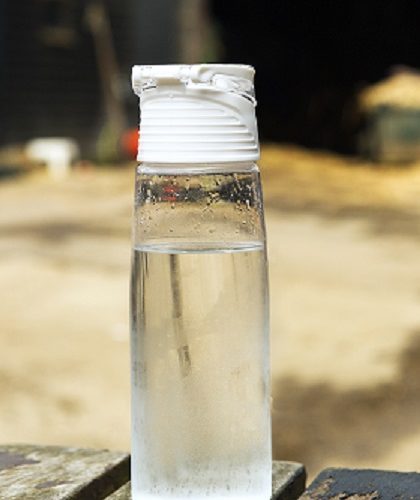Did you know … Over sixty percent of your body is water, and a lot of that water is inside your cells. In fact, two-thirds of your cells’ volume is made up of water. It is really important to stay well hydrated because every system in your body needs water to work properly.
What happens when you drink more water?
• Your joints are better lubricated, which allows them to move more freely and not stiffen up so easily. This can make a difference even if you already have wear and tear in a joint.
• Your digestion improves, as your body needs water to absorb the nutrients from food. Water also helps movement through your digestive tract, so it will help reduce constipation.
• All your cells can work more efficiently—they need water for all the chemical reactions that have to happen for your body to stay healthy. • Your muscles are looser and more flexible when you move and exercise, so they can get stronger without being damaged.
What if you get dehydrated?
There are some warning signs that should let you know that you are becoming dehydrated:
• Urine is a darker color than normal
• Low volume of urine
• Feeling very thirsty
• Reduced concentration
• Headache
• Dizziness
• Feeling tired or sleepy
• Dry mouth
• Dry skin.
Not drinking just because you don’t have enough time or you are worried about not being able to get to a toilet is not a good idea. Some changes that happen in your body when you are dehydrated are:
• Your joints and muscles become tighter and less flexible, which can lead to them feeling stiff and sore. Any problems that you have can feel worse, simply because you need to drink more.
• You are at increased risk of getting a urinary tract infection (UTI).
• Cells can become damaged, which affects their ability to work properly. This can lead to your physical and mental performance suffering.
• Your body can’t control your temperature, heart rate, or blood pressure properly, which can make you feel ill and can be very dangerous.
Make sure that you drink enough:
• The European Food Safety Authority recommends that, each day, women should drink about 1.6 litres and men should drink about 2.0 litres of fluid.
• The amount that you need to drink at a particular time depends on your size, temperature, and activity levels.
• Any liquids that you drink count toward the total, but the recommended amounts are on top of any water that you might be getting from the food that you eat.
• All drinks provide water, but if you are drinking anything other than plain water, remember that your drink will also have other ingredients, which may include sugar and caffeine.
• Sipping your drinks slowly throughout the day is better than drinking a lot in one go.
• It is possible to drink too much water—if your urine is very pale and you are passing a lot of urine frequently, then you may be too hydrated.
Remember that healthy cells lead to a healthy body.
